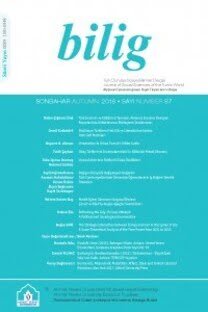Ulusal/Etnik Kimliklerin Stratejik İnşası: Kuzey Kıbrıs Örneği
Bu arşiv çalışmasıyla, Kuzey Kıbrıs'taki siyasi partilerin, Kıbrıs'ın birleşmesi sorunu ekseninde kendi ulusal/etnik kimliklerini -sınırları ve içerikleriyle birlikte- kendi kolektif tasarıları doğrultusunda (Kıbrıslı Rumlarla Türklerin Birleşik Kıbrıs çatısı altında toplanması veya bağımsız Kuzey Kıbrıs Türk Cumhuriyeti'nin yaşatılması) nasıl tanımladıkları araştırılmaktadır. Bu amaçla Kuzey Kıbrıs'taki iki siyasi partinin, Cumhuriyetçi Türk Partisi (CTP) ile Ulusal Birlik Partisi'nin (UBP), 20002005 yılları arasında yayımladıkları her türlü resmi belge derlenmiş, Kıbrıs'ın birleşmesi sorunuyla ilgili olanları seçilerek, Grup Argümanlarının Yapısal Analizi (GAYA) yöntemiyle ve Sosyal Kimlik/Benlik Kategorizasyonu kuramları ışığında incelenmiştir. Bulgular, sosyal grupların, üyeleri tarafından amaçlı bir biçimde inşa edilmekte olduğu görüşünü desteklemektedir. UBP, bağımsız KKTC'nin yaşatılması tasarısı doğrultusunda Kuzey Kıbrıs'ta yaşayan topluluğu Türk ulusunun ayrılmaz bir parçası olarak inşa ederken; CTP 'Birleşik Kıbrıs' tasarısı doğrultusunda aynı topluluğu, Türkiye ve Türklerden ayrıştırmaya çalışmaktadır. Grup tanımlamasının yanı sıra, bulgular 'sorun', 'çözüm', 'tehdit/çıkar' ve 'Avrupa Birliği' konularının da siyasi partilerin kendi tasarılarına hizmet edecek şekilde inşa edildiğini ortaya koymuştur.
Strategic National/Ethnic Identity Constructions: The Northern Cyprus Case
The present documentary study investigates how political parties in Northern Cyprus define the national/ethnic identity of Turkish Cypriots in the service of their own collective projects within the context of Cyprus' unification (the unification of Turkish and Greek Cypriots under the roof of United Cyprus vs. keeping the Turkish Republic of Northern Cyprus/TRNC independent). For this purpose, all the official documents of the two political parties, namely Turkish Republican Party (CTP) and National Unity Party (UBP), published between 2000-2005 were collected; those which were related with the Cyprus problem were chosen and analyzed through the Structural Analysis of Group Arguments technique in the light of Social Identity / Self Categorization theories. The findings support the notion that social groups are constructed strategically by particular members. UBP defines the community living in Northern Cyprus in line with the project of keeping TRNC alive as an inextricable part of the Turkish nation. On the other hand, CTP tries to differentiate the same community from Turkey and Turkish people, in accordance with the project of united Cyprus. Besides group definitions, the findings also reveal that these two political parties construct the issues of 'problem', 'solution', 'threat/interest' and 'European Union' in the service of their own kinds of collective projects.
___
An, Ahmet (1996). Kıbrıs'ta İsyanlar ve Anayasal Temsiliyet Mücadelesi. Lefkoşa: Mez-Koop YayınlarıAtatürk, Mustafa Kemal (1933). Nutuk. TC Kültür Bakanlığı resmi internet sitesi: http://www.kultur.gov.tr/TR/BelgeGoster, erişim tarihi: 06.01.2008.
Denktaş, Rauf (2004). " Annan Planı ve Kıbrıs". TBBM Genel Kurulu Konuşması. 22. Dönem 2. Yasama Yılı, 74. Birleşim.
Haslam, Alexander (1997). "Stereotyping and social influence: Foundations of stereotype consensus". R. Spears, P.J. Oakes, N. Ellemers ve S.A. Haslam (Der.), The Social Psychology of Stereotyping and Group Life: 119-143. Oxford: Blackwell.
Haslam, Alexander vd (998). "The group as a basis for emergent stereotype consensus". European Review of Social Psychology, 22: 251-278.
Hogg, Michel A. ve Dominique Abrams (1993). "Uncertainty reduction". M.A Hogg, ve D. Abrams (Derl), Group motivation: Social psychological perspectives: 173-190. England:Harvester Wheatsheaf.
İsmail, Sabahattin (2000). Cyprus Peace Operation. Lefkoşa: Akdeniz News Agency Publications.
Kızılyürek, Niyazi (2005). Milliyetçilik Kıskacında Kıbrıs. İstanbul: İletişim Yayınları.
Mavratsas, Caesar V. (1999). "National identity and consciousness in everyday life: Towards a sociology of knowledge of Greek-Cypriot nationalism". Nations and Nationalism, 5: 91-104.
Reicher, Stephen vd. (2006). "Saving Bulgaria's Jews: an analysis of social identity and the mobilisation of social solidarity". European Journal of Social Psychology 36: 49-72.
Reicher, Stephen, S. Alexander Haslam ve Nick Hopkins (2005). "Social identity and the dynamics of leadership: Leaders and the followers as collaborative agents in the transformation of social reality". The Leadership Quarterly, 16: 547- 568.
Reicher, Stephen ve Nick Hopkins (2001). Self and Nation. London: Sage. Reicher, Stephen ve Fabio Sani (1998). "Introducing SAGA: Structural analyis of group analysis". Group Dynamics: Theory, Research and Practice, 2 (4): 267- 284.
Sani, Fabio ve Stephen Reicher (2000). "When consensus fails: an analysis of the schism within the Italian Communist Party". European Journal of Social Psychology, 28: 623-645.
Somuncuoğlu, Sadi (2003). Sorularla Belgelerle Kıbrıs: Çözüm mü Çözülme mi? Ankara: Türkiye Sağlık İşçileri Sendikası Yayını
Tajfel, Henry (1978). Differentiation between social groups: Studies in the social psychology of intergroup relations. London: Academic Press.
Talat, Mehmet Ali (2003). "Referandum". Basın açıklaması. 10.03.2003. http://www.ctpkibris.org/basin/1000303.htm. Erişim tarihi: 05/01/2006
Turner, John (2005). "Explaining the nature of power: A three-process theory". European Journal of Social Psychology, 35: 1-22.
Turner, John vd. (1987). Rediscovering the social group. Oxford: Basil Blackwell. Turner, John ve Penelope J. Oakes (1997). "The socially structured mind". C. McGarty ve S. A. Haslam (Derl), The Message of Social Psychology (s. 355- 373). Cambridge: Blackwell Publishers.
Witting, Kerstin (2005). People United in a Country Divided: Bi-Communal Activities In Cyprus. Basılmamış Master Tezi.
- ISSN: 1301-0549
- Yayın Aralığı: Yılda 4 Sayı
- Başlangıç: 1996
- Yayıncı: Ahmet Yesevi Üniversitesi Mütevelli Heyet Başkanlığı
Sayıdaki Diğer Makaleler
Some critical remarks on the "Aruz Rhythmical Poems" in Turkish minstrel Poetry
Giresun'da Yaşatılan Sacayağından Geçme Geleneğinde 'Sacayağı' ve 'Üç' Ne Anlatıyor?
Giresun'da yaşatılan sacayağından geçme geleneğinde'Sacayağı' ve 'Üç' ne anlatılıyor?
Türkiye'nin Yeni Orta Doğu Yaklaşımı
Türkmenistan'da Bir Yağmur İyesi "Burkut Ata"
Siyasi Coğrafya Açısından Sınırlar ve Tarihi Süreç İçinde Türkiye'de Sınır Kavramı
Ulusal/Etnik Kimliklerin Stratejik İnşası: Kuzey Kıbrıs Örneği
